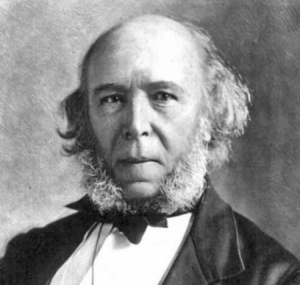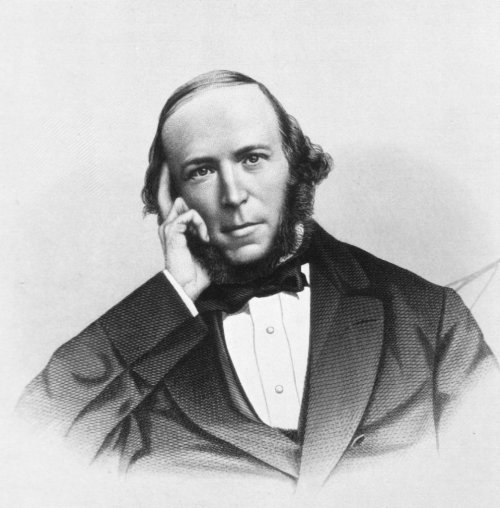Herbert Spencer: Biography and Work

Herbert Spencer was one of the biggest thinkers of his time. This English philosopher, psychologist, sociologist, and natural law expert was the greatest leader of social Darwinism and positivism of his time.
In fact, he applied evolutionist laws to philosophy and society. But his Darwinian ideas justified the dominance of certain people over the rest, as well as the supremacy of one human race over the other races.
These ideas were well-received in the Western world during the 19th century and the first half of the 20th century. His work’s success proves it. Spencer even managed to catch the attention of many thinkers from very different areas.
Some authors were open to debating his ideas. Big names such as Émile Durkheim, George Edward Moore, or Thomas Hill Green were frequently associated with Spencer. Without a doubt, he was a very prolific and controversial figure.

Biography of Herbert Spencer
First years and education
Herbert Spencer was born into a humble family in 1820 in Derby, England. He died in 1903 in Brighton, England. Although he went to school, he didn’t learn how to read until he was seven years old. In his teen years, he studied sciences, but he never stood out as a good student.
He studied engineering completely on his own and he worked in the railway field between 1837 and 1846. During those years, Herbert continued learning and studying by his own means, publishing some books on science and politics. Years later, in 1948, he became the editor of the journal The Economist.
This change put an end to his career as an engineer and started his new career as a writer and philosopher. In 1851, Spencer published his first official book, Social Statics, in which he predicted that humanity would adapt to living in a society without the need of the state.
Career and books
Spencer used to go to meetings with other peer thinkers. In these events, he met some positivist authors that inspired him to write The Principles of Psychology in 1855. In it, he defended that the human mind was subject to natural laws that could be explained through physiology and biology.
Years later, he published A System of Synthetic Philosophy. This work wanted to prove that the evolution principles were equally applicable to philosophy, psychology, and sociology. It was one of his biggest works, made up of 10 volumes that he wrote over a 20-year period.
It wasn’t common at the time for philosophy books to be best-sellers. Usually, best-selling works were mostly novels. However, Herbert Spencer stood out as a very influential thinker, selling over one million copies of his work during his lifetime. He was even nominated for the Nobel Prize in Literature in 1902.
Herbert Spencer and psychology
Herbert Spencer wrote his work before Darwin. Therefore, he merged associationism and physiology with Lamarckism. Thus, Spencer was decades ahead in the psychology of adaptation. He conceptualized development as the process through which the connection between ideas reflected exactly the connection between the dominant events in the environment.
The connections were established by the old principles of continuity and contingency. Therefore, mind development represents an adaptive adjustment to environmental conditions. The English writer also conceptualized the brain as an organized registry of experiences.
On another note, he claimed that instinct was a learned associative habit. He also defended that the mental processes of some species are reduced to the number of associations that the brain of the animal in question can carry out. So, in other words, to Spencer, the differences between the mental abilities of different species were quantitative.
Herbert Spencer and social Darwinism
Herbert Spencer made several statements on a very controversial topic: he defended that social groups had different abilities to dominate nature and establish their supremacy. Thus, the wealthy were more capable than the poor, since the former were at the top of society while the latter were at the bottom.
To Spencer, society worked as a biological being. Thus, he justified the dominance of “superior” races, advocating that we needed to reduce the number of weak people in the world. Thus, imperialism and racism were the foundations of his theories.
For him, strong, smart people had to fight for survival, which meant preventing the deterioration of society. Otherwise, if the weak or least capable outnumbered the strong (physically and intellectually), a country was at risk.

Thoughts on Herbert Spencer’s life and work
In conclusion, Spencer defended a positivist, biological, and evolutionary point of view of philosophy, psychology, and sociology. He considered learning and physical and psychological adaptability very important. But his work was misinterpreted to fit the narrative of racists and supremacists, who quoted it as scientific proof for their claims.
For an author to have his work misinterpreted and adapted isn’t something exclusive to Herbert Spencer’s work. In fact, it has happened over and over again throughout history. Something similar happened to Machiavelli and even Nietzsche. Nazis and anti-Semites used their works to back up racist claims. It’s not easy to talk about the superiority of a group over another without creating controversy.
Besides, philosophical and literary works must be treated from a certain perspective. Therefore, you should research in what time and context those ideas were published so that you’re able to better understand the author’s thoughts.
Controversy and reflections aside, there’s no doubt that Herbert Spencer managed to stand out as the greatest multidisciplinary thinker of his time.
Herbert Spencer was one of the biggest thinkers of his time. This English philosopher, psychologist, sociologist, and natural law expert was the greatest leader of social Darwinism and positivism of his time.
In fact, he applied evolutionist laws to philosophy and society. But his Darwinian ideas justified the dominance of certain people over the rest, as well as the supremacy of one human race over the other races.
These ideas were well-received in the Western world during the 19th century and the first half of the 20th century. His work’s success proves it. Spencer even managed to catch the attention of many thinkers from very different areas.
Some authors were open to debating his ideas. Big names such as Émile Durkheim, George Edward Moore, or Thomas Hill Green were frequently associated with Spencer. Without a doubt, he was a very prolific and controversial figure.

Biography of Herbert Spencer
First years and education
Herbert Spencer was born into a humble family in 1820 in Derby, England. He died in 1903 in Brighton, England. Although he went to school, he didn’t learn how to read until he was seven years old. In his teen years, he studied sciences, but he never stood out as a good student.
He studied engineering completely on his own and he worked in the railway field between 1837 and 1846. During those years, Herbert continued learning and studying by his own means, publishing some books on science and politics. Years later, in 1948, he became the editor of the journal The Economist.
This change put an end to his career as an engineer and started his new career as a writer and philosopher. In 1851, Spencer published his first official book, Social Statics, in which he predicted that humanity would adapt to living in a society without the need of the state.
Career and books
Spencer used to go to meetings with other peer thinkers. In these events, he met some positivist authors that inspired him to write The Principles of Psychology in 1855. In it, he defended that the human mind was subject to natural laws that could be explained through physiology and biology.
Years later, he published A System of Synthetic Philosophy. This work wanted to prove that the evolution principles were equally applicable to philosophy, psychology, and sociology. It was one of his biggest works, made up of 10 volumes that he wrote over a 20-year period.
It wasn’t common at the time for philosophy books to be best-sellers. Usually, best-selling works were mostly novels. However, Herbert Spencer stood out as a very influential thinker, selling over one million copies of his work during his lifetime. He was even nominated for the Nobel Prize in Literature in 1902.
Herbert Spencer and psychology
Herbert Spencer wrote his work before Darwin. Therefore, he merged associationism and physiology with Lamarckism. Thus, Spencer was decades ahead in the psychology of adaptation. He conceptualized development as the process through which the connection between ideas reflected exactly the connection between the dominant events in the environment.
The connections were established by the old principles of continuity and contingency. Therefore, mind development represents an adaptive adjustment to environmental conditions. The English writer also conceptualized the brain as an organized registry of experiences.
On another note, he claimed that instinct was a learned associative habit. He also defended that the mental processes of some species are reduced to the number of associations that the brain of the animal in question can carry out. So, in other words, to Spencer, the differences between the mental abilities of different species were quantitative.
Herbert Spencer and social Darwinism
Herbert Spencer made several statements on a very controversial topic: he defended that social groups had different abilities to dominate nature and establish their supremacy. Thus, the wealthy were more capable than the poor, since the former were at the top of society while the latter were at the bottom.
To Spencer, society worked as a biological being. Thus, he justified the dominance of “superior” races, advocating that we needed to reduce the number of weak people in the world. Thus, imperialism and racism were the foundations of his theories.
For him, strong, smart people had to fight for survival, which meant preventing the deterioration of society. Otherwise, if the weak or least capable outnumbered the strong (physically and intellectually), a country was at risk.

Thoughts on Herbert Spencer’s life and work
In conclusion, Spencer defended a positivist, biological, and evolutionary point of view of philosophy, psychology, and sociology. He considered learning and physical and psychological adaptability very important. But his work was misinterpreted to fit the narrative of racists and supremacists, who quoted it as scientific proof for their claims.
For an author to have his work misinterpreted and adapted isn’t something exclusive to Herbert Spencer’s work. In fact, it has happened over and over again throughout history. Something similar happened to Machiavelli and even Nietzsche. Nazis and anti-Semites used their works to back up racist claims. It’s not easy to talk about the superiority of a group over another without creating controversy.
Besides, philosophical and literary works must be treated from a certain perspective. Therefore, you should research in what time and context those ideas were published so that you’re able to better understand the author’s thoughts.
Controversy and reflections aside, there’s no doubt that Herbert Spencer managed to stand out as the greatest multidisciplinary thinker of his time.
All cited sources were thoroughly reviewed by our team to ensure their quality, reliability, currency, and validity. The bibliography of this article was considered reliable and of academic or scientific accuracy.
- Spencer, H. (1917). Principios de psicología. Revista del Centro de Estudiantes de Filosofía y Letras, 1(2).
- Spencer, H. (1884). El individuo contra el Estado. Editorial MAXTOR.
- Spencer, H. (1867). Creación y evolución (Vol. 16). Escuela Moderna.
- Spencer, H. (1942). La ciencia social. Nueva biblioteca Filosófica.
This text is provided for informational purposes only and does not replace consultation with a professional. If in doubt, consult your specialist.







